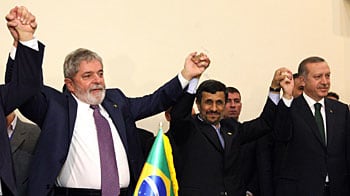
Eight months after backing out of a U.S.-endorsed deal, Iran agreed to a slightly different one yesterday (less of its nuclear stockpile, as a percentage), with a totally different partner (Brazil and Turkey). While time will tell, it may wish it had stuck with the original offer.
Washington's idea last October was to get enough strategic atomic material out of the Islamic Republic in order to gain confidence Iran couldn't use it to build an atomic bomb, thus clearing the way for talks. Because Iran has made more of this material—low enriched uranium—since, it would now be shipping just over half, instead of two-thirds, of its stockpile. This would now leave Iran, even after shipping out the agreed amount of 1,200 kilograms, only months away from having enough uranium to process into their first bomb.
Washington is betting that Russia and China, having come so far toward sanctions, will not back off quickly.
So would this deal be good for the U.S., which had sought to slow Iran down by at least a year, not just a few months? Yes, according to diplomats and U.S. sources: President Obama can now pursue his policy of engagement, they say, while still pressuring through sanctions.
Iran, of course, is offering this deal in an effort to avoid sanctions, dividing and conquering by using the good auspices of U.N. Security Council non-permanent members Brazil and Turkey. These two states represent a third-world option designed to woo developing nations to Iran's side. They also represent two key votes on the 15-member Security Council, which is discussing whether to levy new sanctions on Iran to get it to stop enriching uranium.
In the Alice in Wonderland world of diplomacy over Iran's nuclear program, it is sometimes hard to tell who is being hoisted on whose petard. Iranian nuclear agency chief Ali-Akbar Salehi said Monday that Iran had shown its "goodwill, understanding, and the spirit of cooperation once again." But White House spokesman Robert Gibbs pointed out that if Iran wants to strike the deal, not only is it ignoring previous Security Council sanctions to get it to stop enriching uranium, but it's getting others to up the level to 20 percent, or closer to weapons-grade—a far higher level than the purported use of producing isotopes for medical diagnosis.
"Iran has a history of shafting its interlocutors," says one diplomat about whether Tehran would even honor the deal struck with Brazil and Turkey.
Meanwhile, the United States has deployed considerable diplomatic resources to get key Iranian trading partners Russia and China to back new Security Council sanctions against the Islamic Republic, and on Tuesday it was successful in reaching "agreement on a strong draft with the cooperation of both Russia and China" and other major powers, Hillary Clinton announced. China, say my diplomatic sources, has gone from refusing even to read a U.S. draft of sanctions to working toward a softened version of what was a tough first proposal. No one expects harsh sanctions, such as using interdiction and embargoes to cripple Iran's shipping and oil industries. But Iran remains elusive to a united international front, which would give the West the green light for even stronger punitive measures than just what's agreed at the U.N.
There is also pressure from within Iran, which has been wracked by protests since last June that elections fraudulently kept President Mahmoud Ahmadinejad in power. This political crisis is playing out against a background of high inflation in an already sanctions-hit economy that lacks crucial spare parts for U.S.-made airplanes and high-tech, Western technology needed in the oil industry.
So in Iran's mind, presumably, it's parrying sanctions and gaining more time to develop its nuclear program.
But Gibbs made it clear—as did my sources—that the deal is off unless Iran stops enriching uranium to 20 percent and unless Iran signs on to talks on meeting concerns about its nuclear plans. The United States will meanwhile continue to push ahead at the Security Council. Washington is betting that Russia and China, having come so far toward sanctions, will not back off quickly.
The real deal is yet to be made.
Michael Adler, a longtime reporter for Agence France-Presse, is a scholar at the Woodrow Wilson Center and is writing a book on Iran's nuclear diplomacy, which he has covered for most of this decade.





